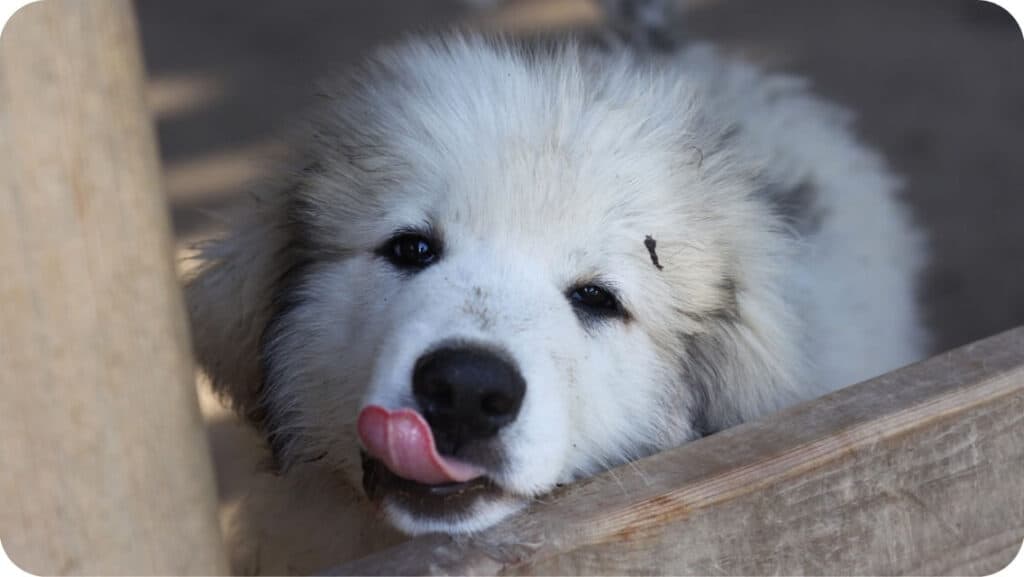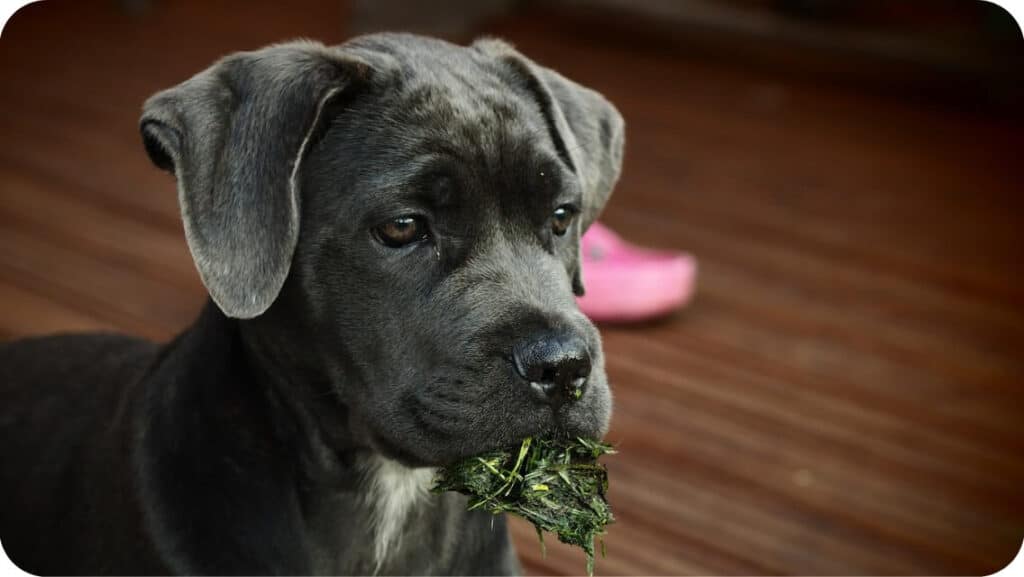Your dog will stick by you from thick to thin, that is why it’s essential to give your canine companion nothing but the best care. Since Fido cannot talk to you or tell you what is wrong, you will have to do all the detective work.
One of the most common issues that dogs have is worms. Some dogs don’t show any signs or symptoms, while others will be holding on to dear life. It can be frightening at first, but with the right strategies and medication, you can help fight off the worms.
It’s vital not to be lazy with worms because they can lead to long-term health issues and complications for your dog.
If you are curious about the ultimate guide of deworming dogs and puppies, then this guide got all the information you need to successfully get rid of these nasty critters.
Popular read: Heat Diapers For Dogs

Make sure you know that it’s a worm
If you see your dog having diarrhea, bloody stool, mucus in stool, reduced appetite, weight loss, fatigue, abdominal pain, or continuously licking their anus, then it’s best to take a closer look.
A lot of times, you can see the worm in the stool.
If it’s an adult hookworm or roundworm, they will look like spaghetti shaped parasite that is white or tan color.
If it’s a tapeworm, then it’s a small, white tan segment that clings to the stool or the genital of the hair.
If you can’t see anything, you can collect the stool, and bring it to the vet to check for potential worms.
Why it’s important to deworm your dog?
Keep in mind that the worm will not go away on its own. That is why it’s essential to deworm your dog.
If you let the worm stay in your dog’s body, it can reproduce and create more worms. This can cause your dog’s stomach to expand, therefore irritate and perforate nearby organs.
Not only that, a huge number of worms can cause your dog to be anemic and malnutrition.
Your dog could also lose his or her appetite.
With long-term infection with hookworms or tapeworms, your dog can lose a lot of nutrients and become sluggish, fatigue, and have other unfavorable symptoms and complications that can lead to death.

The Facts You Need To Know
There are a lot of products out there that can help you deworm your dog. The first thing to do is to bring your dog to a vet to see what kind of medication they recommend.
De-worming medication can come in many types and forms such as tablets, pills, injections, and liquid. Ask your veterinarian which type of deworming medication is perfect for your dog.
If your dog does not take pills very well, your veterinarian might recommend liquid or injection form.
Another thing is that you might want to buy some treats to bury the pills, so your dog is most likely to take the medication without knowing it.
Often times, dogs refuse medications because it doesn’t taste or smell good. With treats and a medication hidden inside, you can rest assured that your dog will successfully consume it.
Related Reading: Why Do Cavalier King Charles Spaniels Smell So Bad?
Some dogs don’t have signs or symptoms
If there are only one or two small worms, then your dog may not show any signs or symptoms. This is mainly because the worms are too small to do any noticeable harm.
However, when the worms get bigger and start to reproduce to create more worms, then your dog will experience something.
Usually, small dogs would show symptoms quicker than large dogs. After all, small dogs have smaller organs and spaces, whereas big dogs would need larger worms to cause some noticeable damage.
It’s best to diagnose and treat this right away to prevent future complications.
Check: What Are The Symptoms Of Dog Constipation?
My dog is sledging and scooting, does that mean he has worms?
Sledging and scooting do not necessarily mean it’s your dog has worms.
Sometimes, your dog may have some skin irritation or some feces stuck in their genital region, so they would start rubbing across your carpet.
However, if you noticed that they have been doing this quite often and that they have other accompanying symptoms such as nausea, vomiting, and diarrhea, then you might want to take them to the vet.
Sledging and scooting are very common, so it’s understandable why owners often make a quick assumption that their dogs have worms.
dramatic symptoms
There are some symptoms that you will notice if your dog has worms.
The first symptom is that his or her abdomen would be bloated or enlarge. Another thing is that your dog will lose his or her appetite, and will get extremely lethargic.
The dog’s coat will seem very dull and rough, and the dog will be coughing and vomiting a lot.
In severe cases, you will notice bloody mucus in diarrhea.
If the worm is big enough, you might even see spaghetti, white strands wiggling around the feces.
When that happens, it’s definitely time to bring your dog to the vet to save his or her life.

can dog worms be dangerous?
Dog worms can also be dangerous to humans as well.
If you or a loved one are picking up poop or playing with the dog, and start eating food with your hands without washing it, then you might consume the worm or the egg.
The worm can travel in your intestine to suck in nutrients. Once the worm grows larger in your body, it can cause symptoms of diarrhea, nausea, and vomiting.
It can be especially dangerous for kids who have a weaker immune system and more prone to malnutrition.
Another thing is that larvae can metastasize from one area to another. If it gets to the brain, it can lead to seizures, confusion, and possibly death.
This is why it’s important to wash your hands thoroughly after playing with the dog or picking up feces.
protecting your environment from worms
Prevention plays a massive role in protecting your dog from getting worms. This means that you will have to take some initiative to clear the environment from worms.
The first step is to pick up all your dog’s feces especially in places where other animals and children like to play and hang out.
Then wash your hands thoroughly to prevent getting infected. It’s essential to cover the sandbox and play areas to avoid contamination.
Another thing is to have your dog tested for intestinal parasites on an annual basis.
Related Reading: How To Protect Your Dog From Summer Heat?

is fresh dog poop dangerous?
If your child just touched a fresh dog poop, then that is nothing to worry about.
This is mainly because the worm eggs require several weeks of incubation before it becomes mature and infective.
That is why it’s essential to pick up the dog feces right away before the egg becomes dangerous and infective.
If your child has just picked up fresh dog poop, just tell him or her to put it down and wash their hands immediately. It’s nothing serious to cry over.

puppies need more attention than adults
Worms are very common in puppies. That is why veterinarians often recommend deworming puppies every 2 to 3 weeks between 4 and 12 weeks.
This is mainly because puppies have a weaker immune system and are very prone to worms.
Keep in mind that most puppies are born with worms, so it would make sense to deworm them more than adult dogs.
individualized worming medications
There are a variety of types and brands of deworming medication on the market.
There are also a lot of factors that determine which type and brand to use on your dog. That is why it is vital to individualize worming medications.
The deworming protocol depends on the type of intestinal parasite that is in your dog, the dog’s size, and his health.
It can be very overwhelming, so it’s best to discuss the options with your veterinarians.
Your veterinarian can recommend the appropriate product for your pet after the proper diagnosis is made.
After all, some pets can also infect humans, so certain deworming meds can be used as a preventative method to reduce transmission.
using over the counter worming medication with care
If you decided to use over-the-counter medication, it’s best to talk to your veterinarian to see which brand is appropriate for your dog.
Each brand is different, and some may not be appropriate for your dog’s health and the type of worm species that your dog is infected with.
Plus, when you use this medication, it’s important to observe your dog ensure that he or she is not allergic to the drug.
After using the meds, it’s also a good idea to make sure that the worms are completely gone. Keep in mind that over-the-counter worming medication may not be as strong as prescription medication.
Sometimes, the worms will still be present, so you may need to switch to a different med.
special deworming meds during your travels
Heartworm is common in many countries, and utilizing preventative heartworm medication is vital if you are traveling with your pet.
Keep in mind that when you return from a foreign country with your dog, you might be required to have tapeworm treatment certify by the vet in your dog’s passport.
You can talk to your veterinarian about the travel requirements to ensure that your dog is protected against any exotic worm that he or she might encounter.

Types of worm that can infect your dog
#1 Roundworms
Roundworms are the most common worms that infect the canine species.
Your dog can get infected by consuming the eggs or being in direct contact with the larvae.
The most common symptoms of roundworm infections are mild diarrhea, vomiting, abdominal swelling, cough, and a poor coat.
Infected dogs would often have diarrhea with spaghetti-looking worms.
If left untreated, this can lead to severe weight loss, abdominal pain, intestinal inflammation, and dehydration.
#2 Tapeworms
Tapeworm uses fleas and lice as intermittent hosts.
Dogs often get infected through heavy flea infestation or hunting near wildlife species.
Tapeworms can cause significant malnutrition, abdominal pain, diarrhea, nausea, and vomiting.
They will require a special type of deworming medication to get rid of.
#3 Hookworms
Hookworms latch onto the lining of the dog’s intestine and continuously drain and feed on their blood.
The dog usually gets infected by consuming the egg or the larvae from the environment or a rodent.
The hookworm can also spread passively through the mother’s placenta and milk.
Hookworm infection can result in severe bloody diarrhea, pale gums, reduce appetite, and diminished coat quality.
#4 Whipworms
Whipworms are parasites that live in the colon and small intestines.
They are thread-like worms that suck and absorb blood around the G.I. system.
The dog gets infected by consuming parasitic eggs. The infection can lead to severe bloody diarrhea, nausea, vomiting, and weight loss.
#5 Giardia
Your dog can get giardia by drinking water and eating grass that is contaminated with infected feces.
The parasite can travel to your dog’s intestines, and become extremely infective.
This can be very troublesome if you have more than one dog in your household.
The most common symptoms of giardia are extreme diarrhea that can lead to severe dehydration.
This can be problematic because it can deplete the electrolytes and nutrients from your dog.
It’s crucial to diagnose and treat this immediately to avoid weight loss and death.
#6 Coccidia
Coccidia is commonly found in the lining of the intestinal tract of the dog.
Dogs are most likely infected by swallowing oocyst that is found in soil and feces.
These oocysts are resistant to environmental conditions and can survive for a long time.
In the right temperature, these oocysts can become extremely infective and release sporozoites that can invade the intestinal lining.
The most common issue that this parasite causes is diarrhea, but most dogs don’t experience any clinical symptoms at all.

Get The Worms Out
There are a variety of strategies to deworm your dog.
The sooner you get rid of these worms, the sooner your dog will feel better and back to his old self again.
Your vet will prescribe your dog a medication through oral route or shots to kill the worm.
The majority of these meds are broad-spectrum mainly because they can treat a wide variety of parasites that reside in the G.I. system.
The significant part about this medication is that they are toxic to the worm but safe for your dog.
Avoid De-Worming Medication
The issues with deworming medication are that it can contain harmful chemicals that can elicit a variety of unfavorable side effects for your dog.
A lot of times, your dogs can get irritated or allergic to these ingredients.
Plus these medications can destroy the structure of the parasite, which can cause a release of cytokine from the worm that can aggravate the dog’s immune system.
This can activate the inflammatory response which leads to symptoms of fever, pain, and tenderness.
Fortunately, there are natural deworming medications that contain organic and safe ingredients that are gentle to your dog’s body system.
You can definitely give these alternative medications a try.
Natural Resource To Prevent Worm
Pumpkin Seeds
In the past, Native Americans have used raw pumpkin seeds to fight a variety of parasitic infections.
That means you can feed pumpkin seeds as a treat for your dog.
Don’t get him the salted one; it’s best to get them the organic seeds and mix it with their dog food.
If your dog doesn’t like them, you can grind them, and add them to his meal or combined them with a bunch of meat.
You can use one teaspoon for every ten pounds.
Black Seed
Oil from the black seed contains a potent ingredient that can destroy the parasitic infection.
Also, black seed can help boost your dog’s immune system to fight off these intestinal infections.
All you have to do is add one teaspoon of seed to your dog’s food on a daily basis.
Learn: How Do I Know If My Puppy Is Allergic To His Food?
Garlic
Garlic is safe if given to your dog in moderation. Garlic can strengthen the immune system to help the dog fight against Giardia and intestinal parasite.
In fact, the garlic ingredient has the same ingredient as ivermectin which is a parasitic medication. Basically, the garlic helps reduce the G.I. mucus to prevent the worm from latching onto it.
If you are interested in using garlic as a natural treatment, you can add it to your dog’s food.
- For small dogs, you can add up to 1/4 of a clove.
- For a medium dog breed, take half a clove, and giant breeds can enjoy one clove.
Make sure to feed your dog the cloves twice a day.
Diatomaceous Earth
This type of ingredient can decrease the number of worms in your dog’s G.I. system, but it’s not that strong against tapeworms.
The feeding instructions entail 1 tsp for small dogs, and dogs over 55 pounds would do wonders with one tablespoon on a daily basis.
It’s vital to mix this thoroughly with your dog’s food, so they don’t recognize the ingredient.

Chamomile
The chamomile can help destroy both worms and roundworms. It may not work that quickly, but it’s effective because of the powerful anti-inflammatory ingredients.
It helps the G.I. tract to reduce discomfort. You can use over 50 mL for every 20 pounds.
Cloves
cloves are powerful against coccidia and Giardia.
For maximum effect, you can give one clove for every 10 pounds of body weight.
The best thing to do is to crush it and mix it with the dog’s food. Each leaf can destroy a parasitic infection.
Make sure you do not give pregnant dogs any cloves because it can lead to miscarriages.

Olive Leaf
Olive leaves can help flush out the parasite. This unique compound is called OLEUROPEIN, which originates from the olive trees.
The extract can be used in your dog’s food. For maximum effect, give 300 mg for small dogs, 500 mg for medium dogs, and 1000 mg for large dogs. It’s best to feed the extract twice per day to your companion.
Neem Leaf
Neem Leaf can help eliminate G.I. parasite, but not tapeworms.
The magical leaf usually requires 150 mg for small dogs, 250 mg for medium size breeds, and 500 mg, for large breeds. It’s best to give this ingredient once per day.
Slippery Elm
Slippery elm is a safe and effective laxative to help get rid of the worms from your dog’s body system.
It’s very soothing and relaxing so they can flush out the parasites without hurting your dog.
All you need is to mix the powder into the dog food. It’s best to utilize 1/8 teaspoons for every 10 pounds of body weight.
How to Prevent Worms Through Medication?
The best way to prevent worm infection is through daily warm medication such as DRONTAL.
Drontal can be given in both tablets and liquid form.
In fact, they are very tasty and can be given to both puppies and dogs.
Keep in mind that fleas can bring in parasites as well, so it’s essential to use flea medication to prevent an infestation.
How To Deworm Your Canine Companion?
Breaking their Heartworms
If your dog is diagnosed with heartworm, then he will need additional imaging tests and bloodwork.
After that, your dog will be started on antibiotics and monthly heartworm prevention treatment.
After a month, your vet will prescribe him a strong medication that requires three shots over the course of two months.
While your dog is on treatment, it’s vital that you keep him calm and relax.
This is mainly because when the treatment kills the worm, it can break into small pieces that blocked nearby blood vessels.
This can definitely happen during an extreme exercise routine and can kill your dog.
That is why it’s best to let him relax and recover for several months.
De-Worm Your Dog Naturally?
You can deworm your dog naturally by providing him or her with powerful ingredients with an anti-parasitic effect.
For example, pumpkin seeds, clove, garlic, and olive leaves have potent actions against parasites worms.
You can mix some ingredients into your dog’s food, and feed them on a daily basis.
It’s essential to check the dog’s feces and to see if his symptoms have improved or not.
If you continue to see the worm in his poop or that his symptoms have not subsided, then it’s time to have a trip to the vet.

How to Deworms By Medicine?
Before using any medication, it’s best to confirm that your dog actually has worms.
It is highly advisable to bring your dog to the vet with a poop sample. The vet would send the fecal sample to the lab to check for worms and the type of worm.
Keep in mind that there are a variety of medications out there, but each of them is used for a specific type of infection. Once you find the species of the worm, then it’s time to fight it off.
Your vet can definitely help you find the appropriate medication or you can do some research online and utilize over-the-counter drugs.
The Side Effects of Deworming your puppy
Bloody Diarrhea
It is perfectly normal to see a streak of blood on your dog’s poop or diarrhea.
This is a good sign because it means that the medication has killed the worms, and the blood is coming from it.
The blood should go away after a couple of days, but if it continues to happen, then it’s best to take your dog to the vet.
Diarrhea
Diarrhea often comes from the inflammatory process that takes place in the G.I. tract.
This is mainly due to the deworming medication where the worms are slowly unlatching and transitioning towards the intestine to get expelled.

How long will my beloved canine friend have diarrhea after the de-worming process?
Diarrhea should last between 24 to 48 hours. If it goes beyond that, then it’s best to bring your dog to the vet.
When your dog has diarrhea, it’s essential to look for dead worms.
If you don’t see any, then this might be caused by a viral infection. If that is the case, then bring him to the vet immediately.

Mood Swings
The whole deworming process is extremely stressful, and your dog will experience some uncomfortable symptoms.
This might cause them to be fatigued and lose their appetite.
The whole mood swing and exhaustion can happen during the week after treatment.
After that, your canine friend should get back to his normal self in no time. It’s vital to have a great supply of food and water to avoid dehydration.
FAQs About Deworming Dogs & Puppies
# Why do I still See the worm moving in My Dog’s Poop After the Deworming Process?
If the worm is still moving in your dog’s poop, then that means the medication is not working very efficiently.
You will have to contact your vet to prescribe another type of drug or purchase another one at the store.
It’s crucial that you wait a couple of weeks to do this; after all, you don’t want to give your dog too many drugs.
# Should I Deworm my Puppy?
You should definitely deworm your puppy. They are very prone to getting these parasitic infections.
Usually, puppies should get dewormed every four weeks until they are about four months old. Keep in mind, just because you get rid of a worm, doesn’t mean that it won’t come back.
After four months, it’s best to provide deworming treatment on an annual basis to prevent potential infection.
# How Long does it take for the worms to be completely gone after the Deworming Process?
Usually, the medication should start working as little as two hours all the way up to 12 hours. You may still see the worm in your dogs’ poop for about a week, but that is completely normal.
If your dog has a severe infestation, then the worms can still be alive for up to two weeks. If the worm is not gone by then, then take your dog to see the vet.

Are You satisfied with the information?
I understand how crazy the whole deworming process can be, that is why I have created this guide to help you out.
Feel free to tell us which part you enjoy the most.
Definitely, let us know which part of the deworming passes you have tried, and which one you are interested in trying next.
If you have any intriguing stories or information, feel free to reply to our comments.
In fact, if you love this article and find that it might be helpful to other people, don’t hesitate to share and like it.
Further Readings
Dog Scooting
Managing Parasites In The Outdoor Dog
Related Topics
1. Dog Dental Cleaning: Ultimate Guide
2. 25 Safety Tips For Working Out With Your Dog
3. 15 Best Dog Shampoos For Odor Control
4. Best Dog Shampoo For Dandruff
5. Best Dog Shampoos For Shedding
6. Why Does Your Bullmastiff Smell So Bad?

